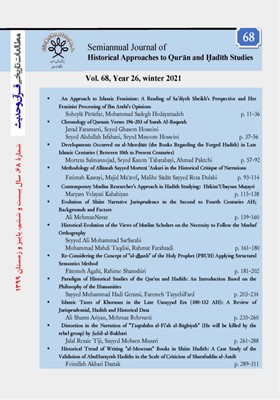Paradigm of Historical Studies of the Qur'an and Hadith: An Introduction Based on the Philosophy of the Humanities
Subject Areas : -SMH Gerami 1 * , fatemeh tayebifard 2
1 - Assistant Professor, Department of Quranic Studies, Institute of Humanities and Cultural Studies, Tehran, Iran.
2 - Master Graduate in Religious and Sufism Studies, Tehran University, Tehran, Iran.
Keywords: Paradigm-Cognition, Philosophy of Human Science, Historical Studies of Quran and Hadith, Quran Exegesis, Evaluation of the Sources,
Abstract :
The paradigm-cognition of historical studies of the Qur'an and Hadith including all efforts to validate sources and understand the text is not thriving in the international academic arena as well as in Iran, and of course, the situation is much worse in Iran. Researchers and students in this field of study generally conduct research subconsciously and automatically under the domination of one paradigm. Lack of this awareness and the creation of new paradigms cause the traditional approaches in the Qur'an and Hadith to be challenged by the evolution of science - something that is growing so fast today - and new questions remain unanswered. Without the formation of a paradigmatic consciousness as well as the awareness of new and competing paradigms, it will certainly not be possible to overcome these challenges and answer new questions. "Philosophy and Paradigm-cognition of Historical Studies of the Qur'an and Hadith" is a suggestion for a new field of study that can provide an independent framework for paradigmatic and philosophical studies in this field, based on which it is easier to understand and analyze traditional and modern questions and concerns in this field. This article will show that despite the serious problems that exist in the field of the paradigm-cognition of historical studies of Quran and Hadith - especially in Iran -, using the philosophy of humanities and social sciences in addition to previous topics, such as skepticism and historic views and Phenomenology - new paradigm dualities such as totalitarianism/individualism, autonomy/homophobia and positivism/interpretiveism can be proposed.
_||_

